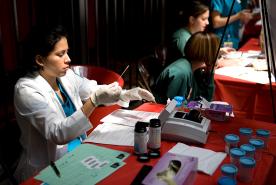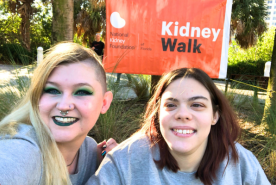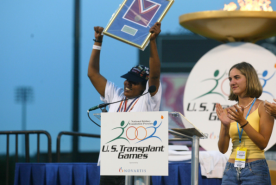September 06, 2022
New data estimates that 50% of people with kidney disease will face financial hardships that create challenges when accessing care. Some may need to leave or take time off from their jobs, struggle to pay for medications, or not know how to apply for or maintain health insurance.
Charles Pecoraro is one such person who found himself in a tough spot after a surprise diagnosis of cancer, high blood pressure, and kidney disease.
Three shocking health discoveries
In June 2019, Charles was being treated for malignant melanoma cancer when he learned that he also had high blood pressure and stage 5 kidney disease.
"I was one of these individuals who always believed that he didn't need insurance. I didn't need to do all these things because my plan was laid out," said Charles. "I had built a business and I was relying upon the money from that business and selling it to retire with."
Unfortunately, with such a late diagnosis, Charles was already suffering from a buildup of toxins in his kidneys.
"I was in kidney failure before I was even aware of it. There were so many toxins built up in my body and brain. It affected my thinking- I called it getting wonky," said Charles. "I was not able to think or communicate properly. I was not able to do what I normally do."
Things went downhill quickly as Charles experienced debilitating emotional, mental, and physical symptoms from the kidney disease. It ultimately affected his ability to continue working, causing him to lose his business.
Delay in care
Charles had to get health insurance to afford care, but he didn't realize how complicated and time-consuming this task would be.
"When I finally got into the system, I discovered there was a seven-day delay to get those things covered. It almost cost me my life," said Charles. "I was very sick and needed lab tests, but the insurance didn't cover them because I was transferring from one state to another."
By the time Charles's tests were covered, he was just days away from death and needed emergency medical care. He thought his insurance ordeal was over but learned that having his heart port removed and dialysis fistula surgery covered would be his next hurdle.
"There was a big debate back and forth as to what insurance was going to cover and a two-and-a-half-month delay before I could actually have the heart port taken out and the fistula put in," Charles said. "It was a very long delay and it even created a medical catastrophe: One day my heart port just wore out and it popped out of my chest."
Charles was finally able to start dialysis in February 2020 but is now struggling to receive the benefits he needs to pay for treatment and living expenses.
Help from a kidney social worker
Sadly, Charles is not the only person who faces delays in care. There are experts, like Beth Witten, a kidney social worker with over 40 years of experience, who can help.
Tips to avoid delay in care:
- Report all symptoms to the doctor immediately so you can be treated quickly and continue working. Many insurance plans through work are more affordable or offer better benefits than private ones.
- Write down the names and phone numbers of everyone you talk to, and keep track of all your medical, insurance, and financial records.
- Your kidney care team or social worker is a great resource to help walk you through the process.
- See if your company is large enough to offer the Family and Medical Leave Act so you can take time off to go to doctor's appointments, the dialysis center, or get home dialysis training.
- If you can't work, visit the Social Security website and look for "The Red Book," which outlines the qualifications of their two major disability programs.
- If you get disability checks without kidney failure, there's usually a 24-month wait to get Medicare. If you have kidney failure and do in-center dialysis, there's a three-month wait. However, if you start a training program for home dialysis or get a transplant as your first treatment, it begins immediately.
Witten also recommends visiting the following websites for more information:
- dol.gov (U.S. Department of Labor)
- ssa.gov/redbook or (800) 772-1213 (Social Security Disability Insurance)
- Healthcare.gov
- Medicare.gov
- Ihs.gov (Indian Health Services)
- Va.gov (U.S. Department of Veteran Affairs)
- Benefits.gov
- Unitedway.org
- shiphelp.org or (877) 839-2675 (State Health Insurance Programs)
- Needymeds.org and mat.org (Medicine Assistance Tool)
Find additional insurance resources for kidney patients and use our free prescription discount card.
Not sure where to start? Get answers from a trained professional through our Patient Information Helpline, NKF Cares.
Advocate for affordable kidney care
Join our network of advocates to make a difference for kidney patients. You can influence public policy relating to kidney health, organ donation, and transplantation through simple activities like emailing, calling, or tweeting your legislators. Your story can help make change happen in government and across the nation. We’ll show you how.
Looking for the latest in kidney research, care, and treatment?
Subscribe to Hot Topics in Kidney Health, the podcast that examines important kidney topics, brings in the experts, and provides actionable tips that you can start using today.









